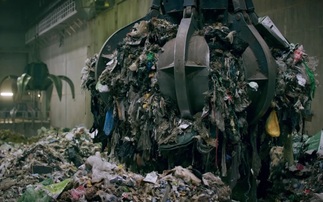A truly green recovery will require a joint effort from government, business and society to overcome the challenge of transitioning to a low-carbon economy, says BT's Gabrielle Ginér
The global lockdown during the current pandemic has seen an unprecedented fall in pollution levels in many parts of the world. This has given us all a chance to take stock.
As the world looks to recover from the current health and economic crises caused by Covid-19, we have an opportunity to accelerate the transition to a modern, clean and healthy energy system.
BT, one of the first companies in the world to commit to a 1.5C pathway, is determined to help lead the way following Covid-19. But a truly green recovery will require a joint effort from government, business and society to overcome the challenge of transitioning to a low-carbon economy.
BT has long recognised the importance of setting ambitious carbon reduction targets as a way of motivating our organisation and inspiring others - setting our first carbon target in 1992.
This long-standing commitment is part of the reason BT was able to achieve its 2020 goal of reducing the carbon emissions intensity of its business by 80 per cent four years ahead of schedule. We then went on to set new ambitious science-based targets - to reduce carbon emissions intensity by 87 per cent by 2030 and then, in 2018, setting a target to become a net-zero emissions business by 2045.
Last year the UK government also committed to achieving net zero emissions by 2050 - a bold move, welcomed by BT.
Targets like these instil business confidence and help to create a shared sense of purpose - inspiring others to act and scale up their own ambitions. From there, we have an opportunity to create ambition loops, where businesses provide support for bold government policies and in turn governments adopt policies that drive further actions by businesses - creating jobs and economic growth.
The Covid-19 pandemic has taken a grim global toll on lives, health services, jobs and mental health, but the climate debate hasn't gone away. And as governments look to lift restrictions and ease the lockdown, we now have a real opportunity to embrace change - moving away from the carbon-intensive model and accelerating investment in clean infrastructure projects.
At BT, we are committed to decarbonising our 32,000-strong vehicle fleet, the second largest in the country. We're already trialling electric vehicles on a small scale and while government and industry have worked hard to promote electric vehicles, we need further action such as long-term stability that will provide innovation and investment in low-emission vehicle technology, a national charging infrastructure that serves everyone - and innovation in non-conventional low-emission vehicles, such as heavy-load vans.
Adopting a light-touch regulatory regime - which allows industry to develop and deploy emission-reducing technologies - has supercharged the renewables market and has the potential to do the same for low emission vehicles.
BT uses almost one per cent of the UK's electricity but has long been a pioneer in renewable electricity; 92 per cent of the electricity we consume around the world is now renewably sourced - and we're at 100 per cent for directly purchased electricity in the UK.
Over the last decade, our energy efficiency programmes have saved almost £300m, allowing us to re-invest those savings elsewhere. This was only possible because of widespread policy support for the generation of renewables that complemented and supplemented the demand in the market.
Last year, our products and services, such as video conferencing and vehicle telematics, helped our customers save 11.7 million tonnes of carbon. Information and Communications Technology solutions are clearly an important part of the answer, with studies showing that they have the potential to enable a 20 per cent reduction of global carbon emissions by 2030. We are already seeing this at BT.
One way the UK can become an environmental leader is through the innovative use of new and emerging technologies to radically decarbonise the economy and clean our air. Our 5G and full fibre networks have the potential to make the Internet of Things (IoT) and the idea of smart cities a reality for many people across the UK.
5G boasts the network capabilities to support the explosion in devices and data volumes that will be generated over the next decade. At BT we're exploring use cases such as 5G Connected Autonomous Vehicles (CAV's) for the movement of people, 5G Connected Automated Goods Vehicles (AGV's) for the movement of goods and things; IoT smart water initiatives, smart traffic solutions and air quality monitoring - all of which have the potential to enable more sustainable ways of moving people and goods within greener smart city environments.
A recent report by the Centre for Economics & Business Research (CEBR) - 'Full fibre broadband: A platform for growth' found that connecting the UK to Fibre-to-the-Premises (FTTP) broadband by 2025 would deliver almost a £60bn boost to UK. The report also revealed that:
- Half a million people could be brought back into the workforce through enhanced connectivity
- At least 400,000 more people could work from home, allowing them to live and work where they choose
- 270,000 people could be freed to move out of cities in rural areas - helping stimulate regional and rural economic growth
- 300 million commuting trips could be saved each year, with three billion fewer kilometres travelled by car
We have been able to take some dramatic steps towards tackling one of society's biggest challenges, but more needs to be done. The coronavirus outbreak has given all businesses the chance to review how they operate; we mustn't lose this opportunity to tackle climate change head-on once it's 'business as usual'.
BT is up for the challenge and we hope that others will join us in setting their own science-based net-zero targets, thereby driving themselves, industry, and policymakers to develop the right conditions for quicker, more impactful climate action.
Gabrielle Ginér is BT's head of environmental sustainability and chair of the UN Framework Convention on Climate Change's Momentum for Change Advisory Committee
For more information, please visit: www.btplc.com/Digitalimpactandsustainability
The Net Zero Leadership Hub is brought to you in partnership with BT, as part of its support for the Net Zero Leadership Stream at the world's first Net Zero Festival this autumn. This article was provided by BT.
You can find out more about the Net Zero Festival and reserve your place here.







